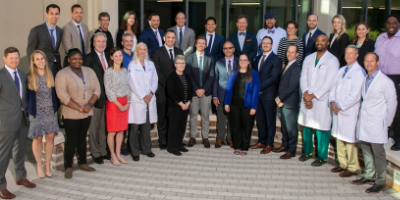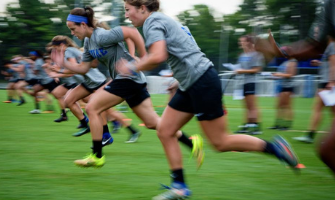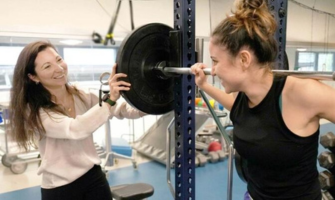The Duke Division of Sports Medicine is internationally recognized for its leadership in sports injury care and recovery. Our team is dedicated to helping every patient—whether a professional athlete or weekend warrior—return to peak performance. As the official sports medicine provider for Duke Athletics, as well as numerous local colleges, universities, and high schools, we treat thousands of athletes annually. Using state-of-the-art technologies, advanced surgical techniques, and evidence-based injury prevention strategies, our specialists deliver comprehensive care tailored to each athlete’s unique needs and goals.

Who We Are
The Duke Division of Sports Medicine is a national leader in the care of athletes of all ages and skill levels. We are proud to serve as the comprehensive sports medicine providers for the athletic programs at Duke University, North Carolina Central University, and Elon University. In addition, Duke is one of only three FIFA Medical Centers of Excellence in the United States and one of just 48 worldwide—a distinction that reflects our commitment to the highest standards in sports injury prevention, treatment, and performance optimization.
Fellowship
The Duke Sports Medicine Surgery Fellowship is designed to train the next generation of orthopaedic sports medicine leaders—exceptional clinicians and surgeons, innovative researchers, skilled educators, and effective advocates for excellence in patient care and academic advancement.
Learn more about the Duke Sports Medicine Surgery Fellowship.

Research
Our current research focuses on enhancing the understanding, prevention, treatment, and rehabilitation of injuries associated with sports and physical activity. We are also working to detect joint injuries and early signs of osteoarthritis before significant damage occurs, enabling earlier, more effective interventions. Additional areas of study include musculoskeletal ultrasound, regenerative medicine, non-operative orthopaedics, and the treatment and recovery of knee and muscle injuries. Our team is also optimizing care for conditions such as clavicle fractures, rotator cuff tears, and arthritis, ensuring that every athlete receives the most advanced, evidence-based care available.
 James R. Urbaniak Sports Sciences Institute
James R. Urbaniak Sports Sciences Institute
The James R. Urbaniak, MD, Sports Sciences Institute has a proud 70-year legacy of national leadership in caring for active individuals, from elite athletes to those simply striving to stay healthy and fit. Located on Duke’s Center for Living campus, the institute offers a diverse range of health and wellness programs and clinics. Our multidisciplinary team, comprising physicians, physical therapists, dietitians, and other healthcare professionals, provides comprehensive care in one convenient location. From injury evaluation and treatment to prevention and performance enhancement, we offer a seamless continuum of care. Patients have access to experts in primary care sports medicine, orthopaedic surgery, physical therapy, sports cardiology, sports ophthalmology, women’s sports medicine, concussion management, and more.
Duke Sports Performance

At Duke, our sports performance experts are dedicated to advancing the science of injury prevention and performance enhancement. We translate cutting-edge research directly into your care, utilizing the latest techniques to help you recover more quickly and perform at your best. Duke Sports Performance combines science with expert coaching to help athletes of all levels optimize strength, speed, and agility. Our team delivers personalized training programs focused on injury prevention, peak performance, and long-term athletic health. Using advanced motion analysis and evidence-based techniques, we identify opportunities to enhance performance and reduce risk. Whether you’re a competitive athlete or returning from injury, we provide the tools and guidance to help you reach your goals safely and effectively.

Duke Female Athlete Program
More than 20 years ago, Duke launched one of the nation’s first women’s sports medicine programs, focused on injury prevention and rehabilitation for active women of all ages. Building on that legacy, the Duke Female Athlete Program now offers the most advanced diagnostic tools and treatments to support the health and performance of female athletes at every level.
Our specialists develop research-driven, personalized care plans tailored to the unique needs of women in sports. Orthopaedic surgeons Jocelyn Ross Wittstein, MD, and Kendall E. Bradley, MD—both former collegiate athletes—collaborate to provide expert guidance on injury prevention and the latest therapies for recovery. Their clinical focus includes procedures commonly needed by young, active individuals, such as ACL reconstruction, patellar stabilization, and shoulder repair. Together, they are advancing care for female athletes through a combination of clinical excellence, research, and personal experience.

The Sports Performance Team at the Duke Sports Sciences Institute (DSSI) welcomes you to your trusted resource for performance insights and essential information to help you gain a competitive edge. Backed by a multidisciplinary team of physicians, physical therapists, sports dietitians, performance coaches, researchers, and other clinical experts, DSSI has developed this newsletter to support student-athletes, their families, coaches, athletic trainers, and administrators. Each edition delivers the latest, evidence-based guidance on training, recovery, injury prevention, and peak performance—ensuring you're equipped to compete at your best in today’s demanding athletic environments.View the latest issue of the Athlete's EDGE newsletter.